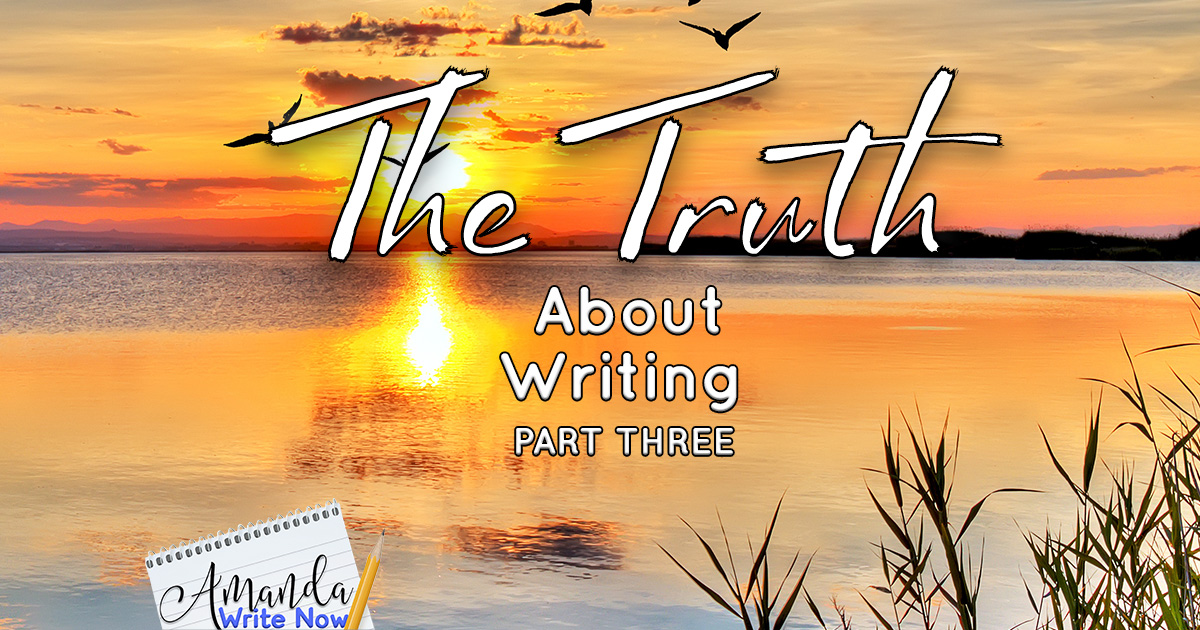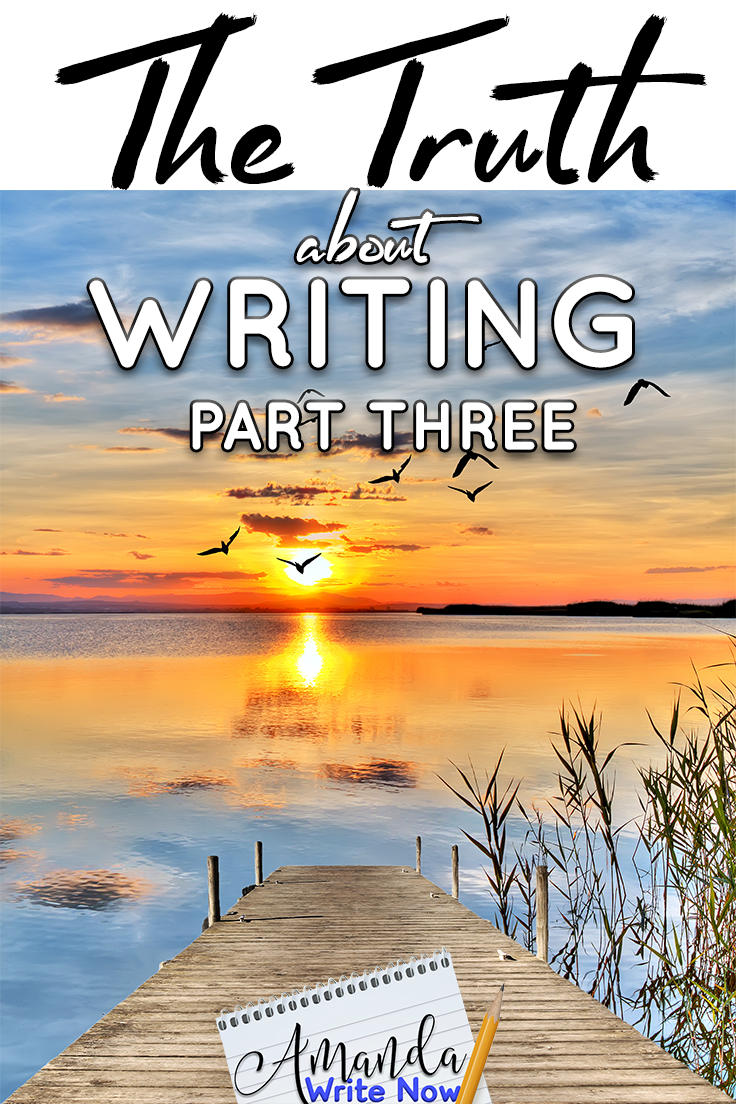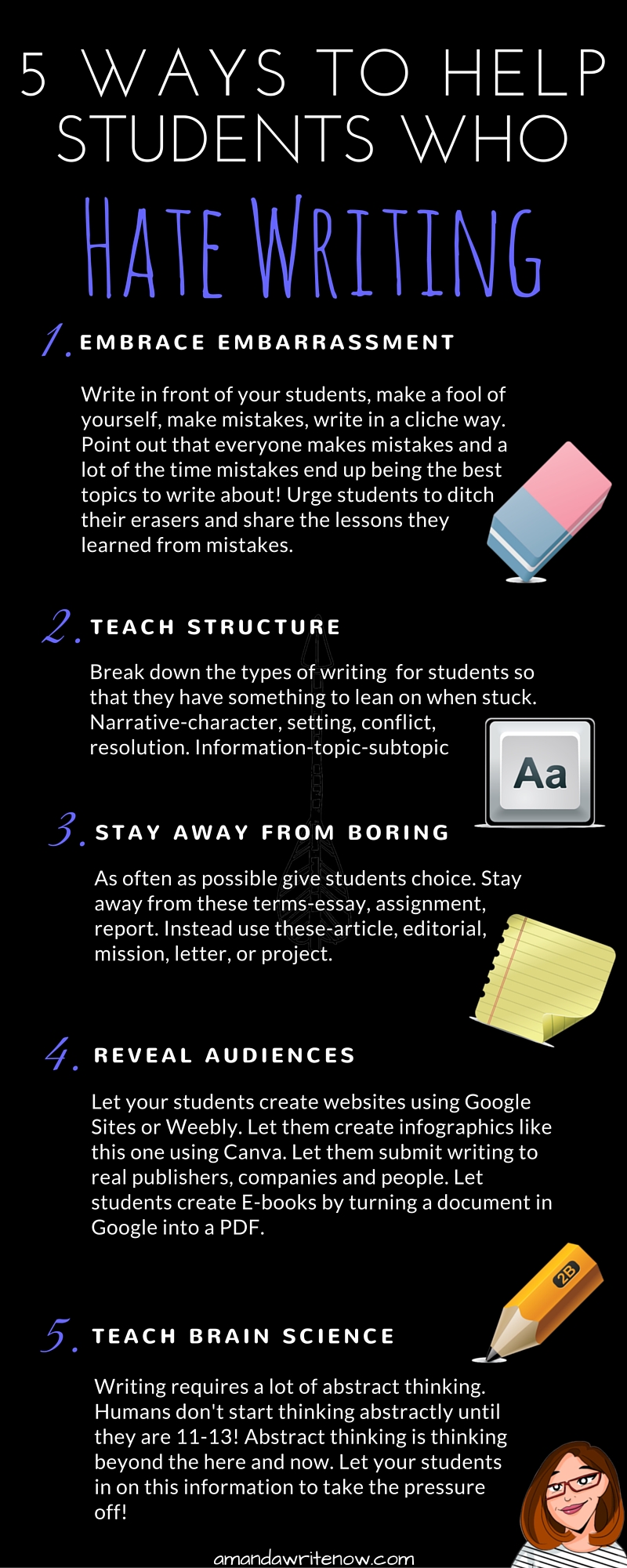
Welcome back! This is part three of a series revealing the truth about writing with mini lessons! In each blog post I provide a mini lesson you can use with your class to discuss topics all students think about but rarely get the chance to talk about in their writing classrooms. Click part one & two below if you missed them…
Part One: Why Your Writing is Not Very Good Awful
Part Two:Why Some Writers Are Better Than Others
Part Three:Why Some People Hate Writing [This Article]
Here are five ways you can support your writing haters:
I taught the proceeding mini lesson with my students (as I do with all mini lessons I post on my site) and their #1 reason for hating writing was grades! I was not expecting this passionate, resounding reaction from my students about how grades stole the joy out of writing for them. This lesson turned into a whole other conversation about how impacted my students lives are by grades. It was a reality check for me. I realized what we should be writing about…changing the grading system at our school, in our district and who knows maybe the country! This is the perfect opportunity to get my students writing passionately and with purpose. You never know where your students can take a mini lesson….
The Hook
Say, “How many of you just can’t stand writing, maybe even hate it?” Make a list of reasons students might hate writing together as a class. Write as many reasons as your students can think of on the board.
The Teaching Point
Say, “Here are five reasons I’ve noticed students might not like writing: 1. lack of structure 2. fear of making embarrassing mistakes 3. boredom 4. lack of audience 5. answers are unclear. 6. grades. Today you will learn some ways to overcome these barriers and keep writing.
Modeling
1. Lack of Structure
Explain to students that all types of writing has a structure. Those who don’t know the structure are most likely going to hate writing because they have nothing to lean on when the writing gets tough and it always does!
Say, “The informational writing structure is usually-step by step or topic and subtopic; narrative writing structure is usually-characters, settings, conflicts and resolution; opinion writing structure usually is- claim, evidence and reasoning. Now that you know these structures you are less likely to hate writing because you can depend on these structures for help when you are stuck.”
2. Fear of Making Embarrassing Mistakes
Explain to students that EVERYONE makes mistakes, sounds dumb and does embarrassing things and let them in on this secret…difficult & embarrassing experiences usually make the best stories! Tell students that in your classroom mistakes and in life in general mistakes should be seen as an opportunity to learn, not something to be embarrassed by.
3. Boredom
Explain to students that sometimes in life they are going to be forced to write about a topic they could care less about. Sometimes parents and teachers think it is their job to choose topics for kids to write about. Say, “In these moments…ask the adult if they could possibly let you write about something you LOVE, push the limits of the adult limiting your choice! Remind them that if you don’t care about the topic neither will your reader!”
4. Lack of an Audience
Say, “Today more than ever an audience awaits…kids can create websites, E-books, apps, YouTube channels, clipart and so much more. You are a writer if you are alive. There is an audience at your fingertips if you choose to write. Don’t wait for an adult to give you a boring old assignment, start creating something, start writing and sharing now.”
5. Answers Are Unclear
Say, “Some hate writing because there is not one right answer. There are many ways to go about saying the same thing and that can be overwhelming. It can be downright scary! Writing requires abstract thinking-a level of thinking about things beyond the here and now to thinking about the past, present, future and connections between. Don’t give up on writing yet, let your brain develop, keep pencil to paper, fingertips to keyboard because I promise, if you do, someday soon you will write something to be proud of.”
6. Say, “I’ve heard from you all that one of the main reasons you dislike writing is because of grades. If you feel passionately about this topic what steps could we take today to change this problem?”
Practice
Say, “Students you are writers and can writers write whatever they want! You can write an opinion, a letter persuading someone to change our school grading policy or you could write a poem, a list, a rap, a script for a video or a fairy tale!” Have students discuss with a partner some ideas about what they could write and then where they could find an audience for what they create. Then…send them off to start.
Work Time/Conferencing
Voice Overs
Compliment students who write quickly and with passion! Move around the classroom taking note of students who seem to sit for awhile, making little effort to write. These are good candidates for your small group conference.
If the majority of your class is sitting and staring off into space or chatty then more guidelines might be necessary. Review the structure of information writing and then have these students pick topics of interests from there (students who are writing quickly and with passion will not need this conference or extra guideline).
Small Group
Work with a group of students who are overwhelmed with the choices and need guidance with picking a topic. Probe students about their interests by asking questions such as, “What do you do at recess? After school? On weekends?”
One-On-One
Pull students who still aren’t sure what to write about even after giving extra guidelines to a small group.
These students may be suffering from all or most of the big five reasons students hate writing. Patience is key. Especially remember with these students that their brains are still developing, they may struggle to think abstractly while also not being sure of their interests AND afraid to make mistakes all at once, poor inexperienced writers! Allow these students lots of time to talk about experiences, interests and opinions. You may even consider typing up the discussions. The more you get them talking and realizing their ideas matter (AND THEY DO!) the more willing they will be to write.
Closure
Sharing writing and experiences with writing is such a powerful way to build community in your classroom. Let students read and talk about their writing in small groups. Ask students to read parts of their writing out loud to the whole class. Give them an opportunity to talk about what they accomplished in the time they had and discuss struggles they had too!
I hope that I have provided insight and inspiration for your writing class through this post. Don’t forget to share on your social media if you found any of this valuable! Thanks a million times over for visiting and reading!





0 Comments